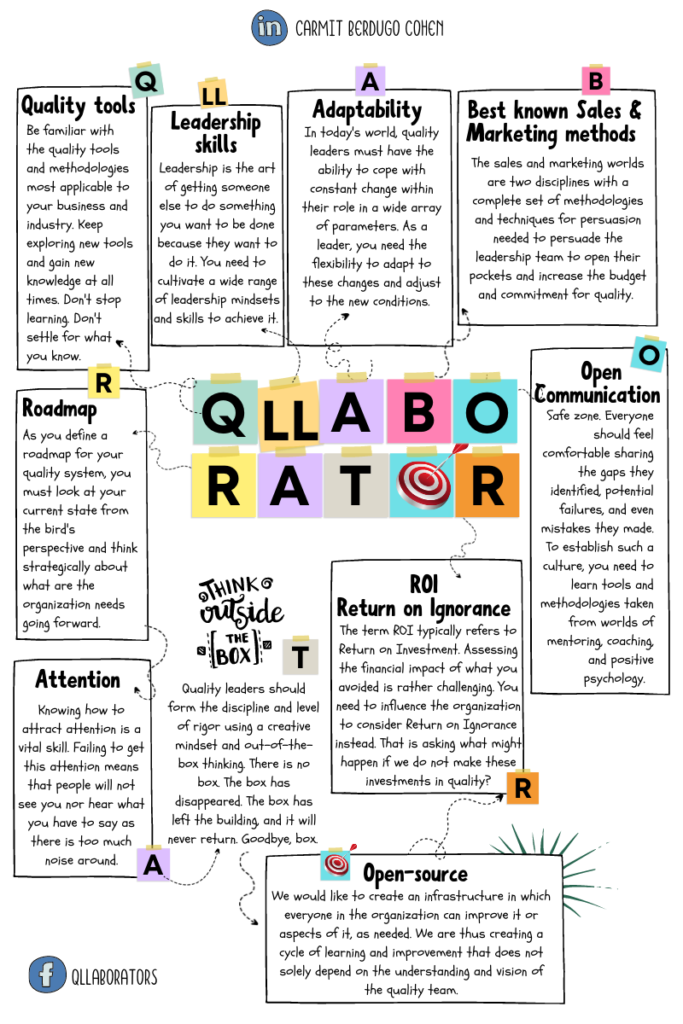
Why Becoming a Qllaborator Is The Only Way to Gain Organization Commitment to Quality
Quality leaders across the globe are facing a crisis. Getting organization attention to comply with the quality system was always challenging, but now becoming increasingly difficult. In response to the rapidly changing global business environment, organizations continually adapt and modify their methodologies to stay competitive. Often, in the process, quality is compromised. People take shortcuts and avoid essential verification steps to meet shorter time-to-market deadlines and multiple late-minute changes in customer requirements. Usually, quality teams will not even engage until it becomes too late.
All agree that company success depends on the quality of its products and services, but we find the same symptoms in all industries, even those that should be more tightly regulated. Multiple factors contribute to this undesirable phenomenon, but the most common causes are skill deficiencies and lack of agility of quality processes. As a result, the top leadership team does not identify the quality department as a significant player in ensuring product or service quality. It usually happens when the quality team is excessively bureaucratic, perceived as just a paperwork carrier instead of a primary value provider. Sometimes, even when the value is decent, the quality leaders do not have the skills to articulate it well and communicate it to their organization. Further, if processes and procedures are outdated and not updated to keep pace with the changing business environments, employees will identify them as irrelevant and skip them.
What do you think will happen, continuing along the same line?
You have two options. You may stop reading this article, murmuring that this is nonsensical, you are doing great, and this writer doesn’t know what she’s doing about leading quality. Alternatively, you can continue reading, understanding that it is up to you to change this reality for your team and the quality system within your organization.
Therefore, if you are reading this particular line, you too agree with the idea that you need to increase your influence as a quality leader. You probably also understand that without modifying the way you think and act, you will find it difficult, if not impossible, to get better results from the ones you get today.
Adapting to new ways of doing things is always challenging. That is why I created this website, the Qllaborator, to restructure a path for you to follow. A qllaborator is a leader who fosters quality through the engagement of management and employees, meaning forming a culture of collaborative quality. Collaboration is crucial for enhancing quality throughout your organization for many reasons, but increasing commitment across the board is one of the most important.
Linkedin group HERE
Facebook group HERE
The term qllaborator comes from replacing the “co” in collaborator with the “q” from quality. But if you’ve been following me for a while, you’ll know how much I love acronyms. Taking a closer look, you can see that this word contains a lot of hints for the mindset and skills you need to become a Qllaborator.

Quality tools and methodologies
It is important that you know the drill and be familiar with the quality tools and methodologies most applicable to your business and industry, which you likely already are. Keep exploring new tools and gain new knowledge at all times. Whatever you do, don’t stop learning, and don’t settle for what you know. Despite your years of experience in the world of quality, there is always something new to learn to help you improve your quality system and yourself.
Leadership skills set
Eisenhower once said that leadership is the art of getting someone else to do something you want done because they want to do it. Taking on this single role entails a broad range of responsibilities. It is crucial to start with a clear vision for the future, thinking about what success will look like in one, two, or perhaps even five years. Secondly, you must inspire and motivate others to be as passionate and committed as you are about this vision. Then, you have to build a team to make sure this vision is delivered as intended. All of this requires a comprehensive understanding and application of leadership skills.
Adaptability
In today’s world, quality leaders must have the ability to cope with constant change within their role in a wide array of parameters like technology, digital space, culture, market, consumer trends, and much more. As a leader, you need the flexibility to adapt to these changes and adjust to the new conditions. Leaders who are adaptive see change as an opportunity to focus on being prepared rather than as an obstacle. Adaptability is a top desirable leadership skill – thus, it gets a featured spot on Qllaborator. Per Charles Darwin’s words, intelligence or strength isn’t as crucial as adaptability in ensuring survival.
Best known Sales & Marketing methods
A thriving quality system requires budgets, headcounts, and the attention and collaboration of everyone. For all of this to happen, it is necessary to promote quality at every level of the organization. You must persuade the leadership team to open their pockets and increase the budget for quality. The sales and marketing worlds are two disciplines with a complete set of methodologies and techniques for persuasion. The goal is not necessarily to become a sales expert, but you should know the basics and acquire tools to help you sell quality internally.
Open Communication
Having a safe zone where people can speak up is essential for a successful quality system (and a successful quality leader). Everyone should feel comfortable sharing with you and other members of the team the gaps they identified, potential failures, and even mistakes they made. To establish such a culture, you need to learn tools and methodologies taken from worlds of mentoring, coaching, and positive psychology.
Roadmap
As you define a roadmap for your quality system, you must look at your current state from the bird’s perspective and think strategically about what are the organization needs going forward. As a result, you must re-evaluate how you perform and reflect on your focus areas, interfaces, and processes. In this way, the organization stays on the same page regarding the scope, objectives, and timeline of quality-related initiatives, which naturally increases management commitment to quality.
Attention
Having quality acknowledged in your organization depends on how you attract attention. This skill is vital because attention spans are short, and quality leaders often compete with others within the organization. Failing to get this attention means that people will not see you amid their everyday activities; nor hear what you have to say as there is too much noise around. As a result, your key messages will not reach their destination, and most importantly, people will not engage with you.
Think outside the box
Often, people associate the term quality with words like rigor, robust, process, and less with words like creativity or out of the ordinary. And this is precisely the problem as, in our hectic world, quality leaders should form the discipline and level of rigor using a creative mindset out of the box thinking, as we do in the EPIC Quality leader workshop. Or, as I like to put it, there is no box. The box has disappeared. The box has left the building, and it will never return. Goodbye, box. We will never meet again.
Open-source
The term open source originally refers to publicly accessible code, which anyone can view and modify. The code is the quality system in our use case, and we would like to create an infrastructure in which everyone in the organization can improve it or aspects of it, as needed. We are thus creating a cycle of learning and improvement that does not solely depend on the understanding and vision of the quality team, which is sometimes limited.
ROI Return on Ignorance
The term ROI typically refers to Return on Investment, a performance metric used to evaluate the efficiency or profitability of an investment. In many organizations, it plays a role in decision-making, thus affecting investment in quality, as assessing the financial impact of what you avoided is rather challenging. Your goal as a qllaborator is to influence the organization to consider Return on Ignorance instead. That is asking what might happen if we do not make these investments in quality? Once you have accomplished that, it will be easier to build a strong quality team and secure the necessary budget.
In conclusion, becoming a Qllaborator is an exciting journey, filled with learning and experimentation, with more ups than downs, that will bring you to new heights in your career, so why not give it a try?

